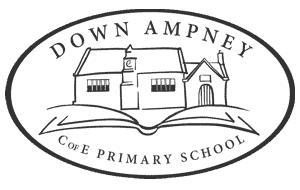
Positive relationships, based on examples from Christianity, are central to the flourishing of this school.
Siams, Jan 2020
Religious Education
Intent
The aim of Religious Education at Down Ampney is that children develop respect, acceptance and tolerance for different beliefs; gain an understanding of and interest in what people believe and how this is shown through the way they live; develop the ability to ask and answer questions about: meaning and purpose in life, beliefs, issues of right and wrong and what it means to be human; make connections between religious and non-religious beliefs, concepts, practices and ideas and are able to reflect on religion and belief and their own ideas and ways of living.
The RE curriculum is planned following the Gloucestershire Agreed Syllabus for Religious Education, which reflects that religious traditions in Great Britain are in the main, Christian, while taking account of the teaching and practices of the other principal religions represented in Great Britain.
Our approach not only develops children’s knowledge and understanding of different religions and beliefs but also fosters respect, tolerance, and mutual understanding among pupils of diverse backgrounds. Our curriculum is rooted in promoting spiritual, moral, social, and cultural development, whilst also encouraging critical thinking, reflection, and a sense of wonder about the world.
Children are able to apply their understanding of religions and their impact across the curriculum into other areas, such as History.
We provide a range of opportunities for children to engage with the local community and faith leaders, enabling them to apply their learning in real-world contexts and develop a deeper appreciation of diverse religious traditions, such as attending and being part of events at the Cathedral, attending church services, visiting the Mosque, taking part in a Spirituality Day and witnessing the installation of the new stained-glass window in the local church.
Implementation
Staff attend the annual RE Conference as well as actively participating in local RE Hubs and ECT courses for teachers within church schools. Planning is supported by RE Today through The National Association of Teachers of Religious Education, which ensures progression in pupils’ learning, from building foundational knowledge to promoting higher-order thinking skills such as analysis, evaluation, and interpretation of religious ideas and practices.
There are three main elements to the teaching and learning approaches in the Gloucestershire Agreed Syllabus:
Making sense of beliefs: making sense of core religious and non-religious beliefs and concepts; understanding what these beliefs mean; recognising different sources and developing skills of interpretation.
Making connections: evaluating, reflecting on and connecting the beliefs and practices studied; allowing pupils to challenge ideas and making connection between the areas of study and our own lives.
Understanding the impact: understanding how and why people put their beliefs into action in their own lives, in their communities and in the wider world.
These three elements offer a structure through which pupils can encounter diverse religious traditions alongside non-religious worldviews – which reflect the backgrounds of many of the pupils in our school and wider community.
Teaching and learning in the classroom incorporate all three elements, allowing for overlap between elements as suits the religion, concept and question being explored. Teachers create a safe and inclusive learning environment where pupils feel comfortable discussing their own beliefs and asking challenging questions.
Assessment in RE focuses on capturing the breadth and depth of pupils’ understanding, not just of factual knowledge but also of their ability to reflect on and articulate their personal beliefs and values.
Impact
The impact of our RE provision is evident in the holistic development of our pupils, both academically and personally. Children demonstrate a deep respect for others’ beliefs, a keen awareness of cultural diversity, and a strong sense of social responsibility. Children exhibit critical thinking skills, the ability to express their own beliefs articulately, and a curiosity about religious and ethical issues. Children demonstrate positive attitudes towards their learning, confidence in discussing complex and sensitive topics, and an ability to engage in respectful dialogue with peers of different faiths or beliefs. Pupils show a sense of empathy, compassion, and tolerance towards others, reflecting the values of mutual understanding and community cohesion.
“Down Ampney exemplifies how a considered and deeply held vision and values transform a community.” Siams, Jan 2020
RE Long Term Plan progression – EYFS-Y6

